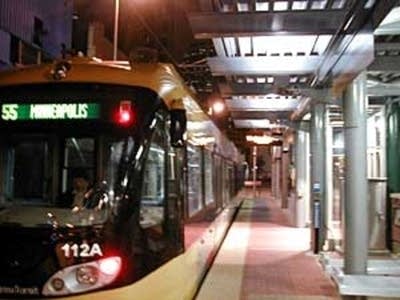What will light-rail do to St. Paul?
Go Deeper.
Create an account or log in to save stories.
Like this?
Thanks for liking this story! We have added it to a list of your favorite stories.

The hearing inside Central High School's hot and dark auditorium yielded far more testimony than the previous three meetings. About 200 people attended, and about 80 of them testified before the Ramsey County Regional Railroad Authority.
Most of the comments sounded like this one from business owner Rickie Young.
"It's going to open up a lot of opportunities; not just for myself and for a lot of other people that work around St. Paul, but it's going to make the city of St. Paul energized," Young said.
Testimony during the two-and-a-half hour hearing was skewed heavily in favor of a proposed $840 million light-rail project over a less expensive bus transit alternative.
Turn Up Your Support
MPR News helps you turn down the noise and build shared understanding. Turn up your support for this public resource and keep trusted journalism accessible to all.
Billy Dinkel, who works in downtown St. Paul, admits he drives a big gas-guzzling Ford, and he doesn't take mass transit. But he says he supports light rail 100 percent.

"The downtown of St. Paul needs this economic boom to move workers into St. Paul and to move people and give people the freedom to work wherever they would like in the metropolitan area," he said.
The business community made a strong showing at the hearing. Representatives from local chambers of commerce and corporate executives from Xcel Energy, HealthEast and Ecolab, among others, dominated the testimony on behalf of light rail.
Three previous hearings brought out the same arguments about why an 11-mile light-rail line connecting downtown St. Paul and downtown Minneapolis means economic development for the region. They say fixed transit systems, like the existing Hiawatha light-rail line in Minneapolis, prove that jobs, customers and homebuyers come attached to light-rail development.
But about a quarter of the people giving testimony questioned the benefits of light rail for those already living in the area. They referred to the proposal as "corporate welfare," charging that the light-rail plan would hurt, not help, the communities the train would travel through.
Ora Lee Patterson was the first of several speakers to invoke St. Paul's past as a warning of what could be in store for her community.
"I have seen the tearing up of Rondo, the business community, for the sake of a freeway. And there are still some of us that are around that experienced that and we're still going through that pain, and now we're suffering the pain of a central corridor coming down the middle of the street on University Avenue and we're wondering about the ramifications of all of that," Patterson said.
Patterson's glance back at Rondo sums up the fears of many low-income and minority residents living on or near University Avenue.
St. Paul's Rondo neighborhood was a thriving African-American business and residential district that was destroyed in the 1950s and '60s to make way for Interstate 94.
St. Paul NAACP President Nathanial Khaliq says many residents are worried they'll be moved again, that they'll lose everything in the name of "progress."
"We would want you to take into consideration what kind of compensation are we going to get when land values increase and many of us are going to be taxed out of the neighborhood?" he asked.
The hearings came to a close with an overwhelming majority of testimony endorsing the light- rail plan.
Officials running the series of hearings say they will pass on community concerns to the Metropolitan Council, which will make the final selection of a transit option for University Avenue around the end of June.
Though the public hearings are now closed, the Ramsey County Railroad Authority will continue to accept written testimony until June.




